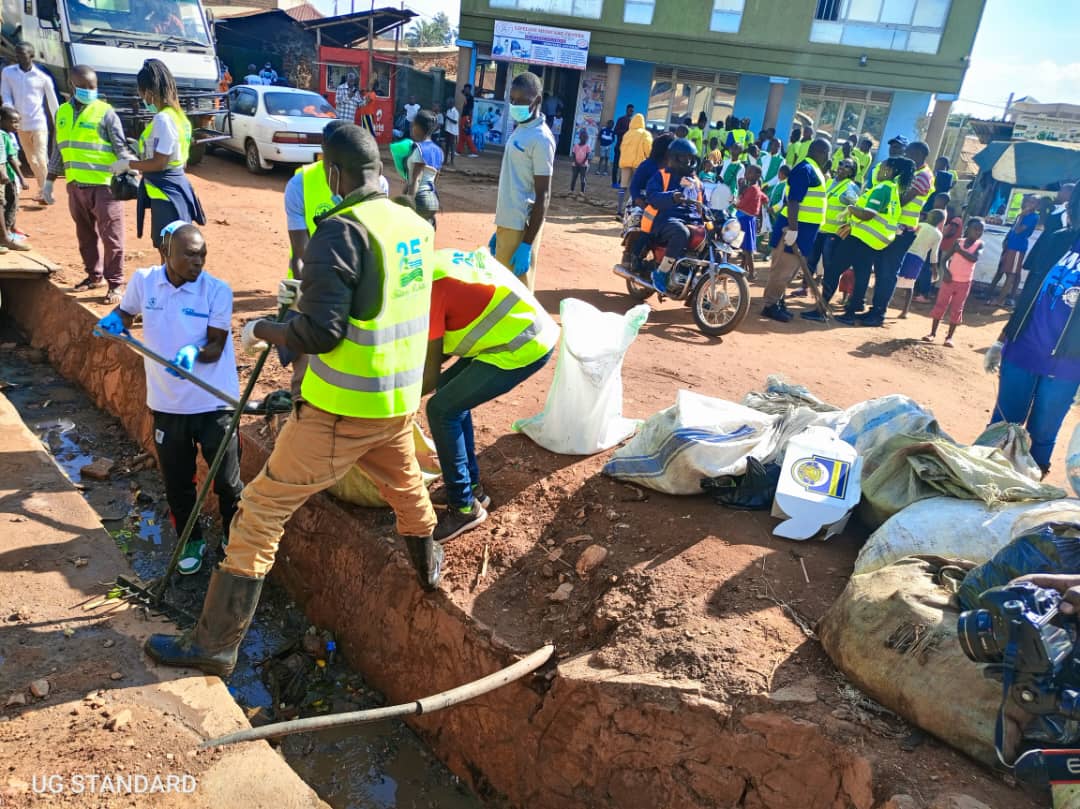
KAMPALA – Ahead of its Silver Jubilee celebrations slated for Thursday, September 29, Community Integrated Development Initiative (CIDI) has led a sensitization and a joint cleaning exercise in Kisenyi, Luzira, Nakawa Division to raise awareness of the dangers of improper waste disposal.
The exercise, also attended by CIDI Executive Director, Dr. Fulgensio Jjuuko and area political leaders including Nakawa East constituency Member of Parliament Ronald Nsubuga Balimwezo and Nakawa Division Mayor Mr. Paddy Mugambe also sought to shine a light on CIDI’s 25 years’ journey in community development.
Other partners who participated in the exercise include Kampala Capital City Authority (KCCA) and the local communities.

Speaking to reporters, Dr. Jjuuko urged communities to keep clean by washing their hands regularly and ensuring that their environment is clean and adding that “everybody must play their part”.
“This day is to mobilize communities to clean the areas but also to understand that it has to be a continuous process for them to clean,” he said,
Adding, “If they clean and they have a good environment, they will not have to spend a lot on hospital bills.”


Dr. Jjuuko whose organization was the first to venture into waterborne toilets in public areas and schools, they have managed to develop a robust WASH infrastructure in all the divisions of Kampala, but funding has remained a key challenge.
“We have educated children in schools with the hope that, if we change their mindset and they grow [up] knowing that sanitation is very important, then our program will have created an impact on communities,” he said adding that where “we have done, we see a lot of difference and some of them have taken the knowledge to their parents.”
Uganda is faced with frequent outbreaks of emerging diseases and a high burden of other endemic conditions, including cholera, all of which require dedicated resources for their prevention and control.
According to the World Health Organization, contaminated water contributes to the pervasiveness of diarrheal diseases, such as cholera, typhoid fever, and dysentery. Waterborne illness is the leading cause of death for children.
“Clean hygiene and a sanitary environment are key to preventing child outbreaks and poor health,” Ms. Hellen Kasujja, the deputy executive director said.
“We want to see social behavior change. We want Ugandans to ensure that cleaning their environment is aware of life because it is very critical especially now that the rainy seasons are here. We usually have a break out of Cholera, dysentery, and typhoid within the rainy season so we have to have an abundance of caution as communities,” she said.

Also with the emergency of Ebola, she explained that it’s very critical that people wash their hands with water and soap regularly.
“We should develop a culture of cleanliness,” she added.
Nakawa Division Mayor, Mr. Paddy Mugambe said the situation in the Kisenyi area was terrible since most of the drainage systems had been blocked due to improper waste disposal.
“CIDI has worked with us for about seven years and they have made a difference by supplementing our efforts. We call upon the to continue helping us,” he said.
“I call upon our people to take the lead in ensuring sanitation and hygiene is good because CIDI might to be here forever,” he said, reminding communities to stay over the Ebola outbreak.
He said one way of preventing it is through regular handwashing and hygiene and sanitation at home.

Nakawa East Constituency MP Balimwezo blamed the contamination of Lake Victoria on poor waste management by communities on the landing sites and nearby areas.
He explains that the material could be deposited into the surrounding environment once the water recedes hence causing serious health risks to the community and long-term negative effects on the soils.
On Tuesday, health authorities in Uganda said they had detected an Ebola case in Ngabano village, Mubende district in the central part of the country, involving a 24-year-old male patient who succumbed to the highly contagious hemorrhagic fever.
Uganda has had over five Ebola outbreaks in the last two decades, mostly along its western regions close to the Democratic Republic of the Congo, according to the Ministry of Health.

The Ebola virus is highly contagious and causes various symptoms including fever, vomiting, diarrhea, generalized pain or malaise, and in many cases internal and external bleeding.
According to WHO, the fatality rate for those who contract Ebola ranges from 50 percent to 89 percent, depending on the viral sub-type.

















